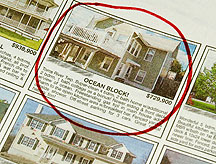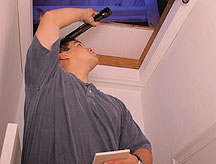Foreclosure filings spike 71%
Third quarter numbers saw a sharp rise compared to last year; in September, 81,312 homes were repossessed by lenders.
| 30 yr fixed | 3.80% |
| 15 yr fixed | 3.20% |
| 5/1 ARM | 3.84% |
| 30 yr refi | 3.82% |
| 15 yr refi | 3.20% |
NEW YORK (CNNMoney.com) -- The housing crisis still has a choke hold on America: In September, 81,312 homes were lost to foreclosure, according to a report released Thursday.
RealtyTrac, an online marketer of foreclosed properties, said that 851,000 homes have been repossessed by lenders since August 2007.
In September, 265,968 troubled borrowers received foreclosure filings - such as default notices, auction sale notices and bank repossessions. That's a decline of 12% from the record high number of filings in August, but 21% more than in September 2007.
All told 765,558 foreclosure filings were made on U.S. properties in the third quarter of this year - up 3% from the second quarter and 71% from the same period last year.
"We have never seen a foreclosure cycle like this one before," said Rick Sharga, Realty Trac senior vice president. Other periods of elevated foreclosure rates have been preceded by signs of economic weakness. However, "in this cycle, we have foreclosure problems that have caused an economic downturn."
The most recent monthly dip in foreclosure filings was caused largely by decisions by several states to relax housing laws.
"Much of the 12% decrease in September can be attributed to changes in state laws that have at least temporarily slowed down the pace at which lenders are moving forward with foreclosures," Realty Trac CEO James Saccacio said in a statement.
For instance, California - one of the states hardest-hit states in the housing crisis - has a new law that requires banks to contact struggling homeowners at least 30 days before delivering a notice of default. That's helped to drastically slow the number of foreclosure filings in the state.
"In September, we saw California [defaults] drop 51% from the previous month," said Saccacio. "That had a big impact on the national numbers since California accounts for a third of the nation's foreclosure activity."
North Carolina passed a similar law, and notices of default there fell by 66% in September.
Unfortunately, even these extensions aren't saving most troubled borrowers. "The intention is very worthwhile, but I think the net result in most cases is simply delaying the inevitable," said Sharga.
"If a few homeowners are able to stay in their homes as a result of the legislation, then it had a positive effect," said Sharga. However, "the longer you are in foreclosure, the harder it becomes to pay the debt you owe to get out of foreclosure," he added.
Circumstances in Massachusetts illustrate his point. That state enacted a law back in May requiring lenders to give troubled homeowners 90 days notice before initiating foreclosure, which pushed the number of foreclosure filings it reported way down for several months. But in September, when the law expired, filings spiked.
"Initial foreclosure filings in Massachusetts jumped 465% from August to September after being much lower than normal in June, July and August," said Saccacio.
Nevada once again had the nation's highest foreclosure rate, with one out of ever 82 homes in foreclosure. Florida had the second highest rate in September, with one in every 178 homes in default. California came in third, with one in every 189 homes there receiving foreclosure filling last month.
As foreclosures continue to wreck havoc across the nation's housing market, the U.S. government has announced unprecedented efforts to absorb toxic debt and shore up investor confidence. The "Hope for Homeowners" rescue bill went into effect Oct. 1 and will allow some troubled borrowers to refinance into mortgages backed by the Federal Housing Authority. And more recently, a massive financial rescue plan calls for Treasury to buy up troubled assets, mostly backed by bad loans, to stabilize the financial system.
However, as home buyers and lenders wait to see the effects of the plans, "there is a lot of uncertainty in the market right now," said Sharga.
Still, he thinks that the market could be nearing a bottom, even as uncertainty remains high.
"If everything goes right, we will be done with almost all the subprime loans by sometime in the first quarter of 2009," said Sharga. "The market could start to stabilize at that point."
The bad news: The housing market will be flooded with bank-owned homes. "We are estimating that by the end of this year, between one quarter and one third of all homes for sale will be bank owned properties," he said.
That could push down prices even more, perpetuating a vicious cycle, but it might also start to attract bargain hunters who may absorb some of the massive housing inventory. ![]()






